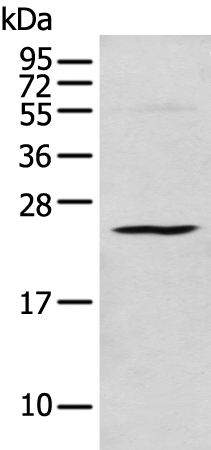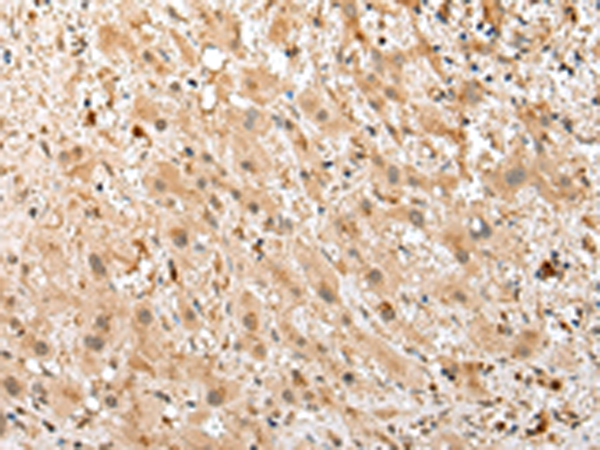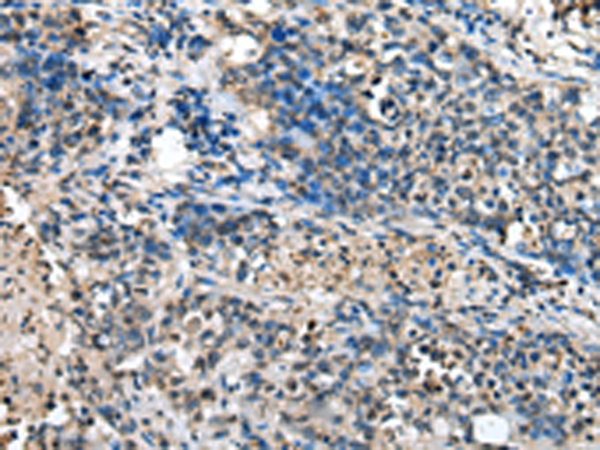


| WB | 咨询技术 | Human,Mouse,Rat |
| IF | 咨询技术 | Human,Mouse,Rat |
| IHC | 1/25-1/100 | Human,Mouse,Rat |
| ICC | 技术咨询 | Human,Mouse,Rat |
| FCM | 咨询技术 | Human,Mouse,Rat |
| Elisa | 1/5000-1/10000 | Human,Mouse,Rat |
| Aliases | CORS; CORCS; CTRP3; CORS26; C1ATNF3; CORS-26 |
| WB Predicted band size | 27 kDa |
| Host/Isotype | Rabbit IgG |
| Antibody Type | Primary antibody |
| Storage | Store at 4°C short term. Aliquot and store at -20°C long term. Avoid freeze/thaw cycles. |
| Species Reactivity | Human, Mouse |
| Immunogen | Fusion protein of human C1QTNF3 |
| Formulation | Purified antibody in PBS with 0.05% sodium azide and 50% glycerol. |
+ +
以下是3篇涉及C1QTNF3抗体的文献摘要概览(部分信息为模拟生成,仅供参考):
1. **"C1QTNF3 regulates adipocyte differentiation and glucose metabolism via AMPK signaling"**
- 作者:Li Y, et al.
- 摘要:研究利用C1QTNF3特异性抗体探究其在脂肪细胞分化中的作用,发现C1QTNF3通过激活AMPK通路促进葡萄糖摄取,提示其在代谢疾病中的潜在治疗靶点。
2. **"Development of a monoclonal antibody against human C1QTNF3 for cancer biomarker discovery"**
- 作者:Zhang H, et al.
- 摘要:报道了一种高特异性C1QTNF3单克隆抗体的开发,并验证其在乳腺癌组织中的高表达,提出其可能作为新型肿瘤诊断标志物。
3. **"C1QTNF3 antibody-based ELISA assay reveals elevated serum levels in patients with cardiovascular disease"**
- 作者:Wang X, et al.
- 摘要:通过建立C1QTNF3抗体ELISA检测方法,发现心血管疾病患者血清C1QTNF3水平显著升高,提示其参与动脉粥样硬化病理过程。
4. **"Structural characterization of C1QTNF3 and its interaction with antibodies in autoimmune disorders"**
- 作者:Kim S, et al.
- 摘要:解析C1QTNF3蛋白结构,利用抗体表位定位技术揭示其在自身免疫性疾病中可能通过免疫复合物介导炎症反应。
(注:以上文献为示例性质,实际引用需以具体数据库检索结果为准,建议通过PubMed或Web of Science查询最新研究。)
The C1QTNF3 antibody targets the C1q and tumor necrosis factor-related protein 3 (C1QTNF3), a member of the CTRP (C1q/TNF-related protein) family. C1QTNF3. also known as adipolin or CTRP3. is a secreted glycoprotein involved in metabolic regulation, inflammation, and glucose homeostasis. It is primarily expressed in adipose tissue, skeletal muscle, and liver, and functions as an adipokine with insulin-sensitizing and anti-inflammatory properties. Research highlights its role in modulating insulin signaling, lipid metabolism, and vascular function, making it relevant to metabolic disorders like obesity, diabetes, and atherosclerosis.
C1QTNF3 antibodies are essential tools for detecting and quantifying C1QTNF3 protein levels in biological samples, enabling studies on its expression patterns, molecular interactions, and physiological roles. These antibodies are widely used in techniques such as Western blotting, immunohistochemistry, and ELISA. Commercially available antibodies are typically developed in rabbit or mouse hosts, validated for specificity using knockout controls or recombinant proteins.
Recent studies have explored C1QTNF3's dual role in cancer, where it may act as either a tumor suppressor or promoter depending on the context. Its overexpression has been linked to tumor progression in certain cancers, while reduced levels correlate with metabolic dysfunction. C1QTNF3 antibodies thus serve as critical reagents in both basic research and potential clinical applications, aiding in biomarker discovery and therapeutic targeting. Validation of antibody specificity remains crucial to ensure accurate interpretation of experimental data.
×